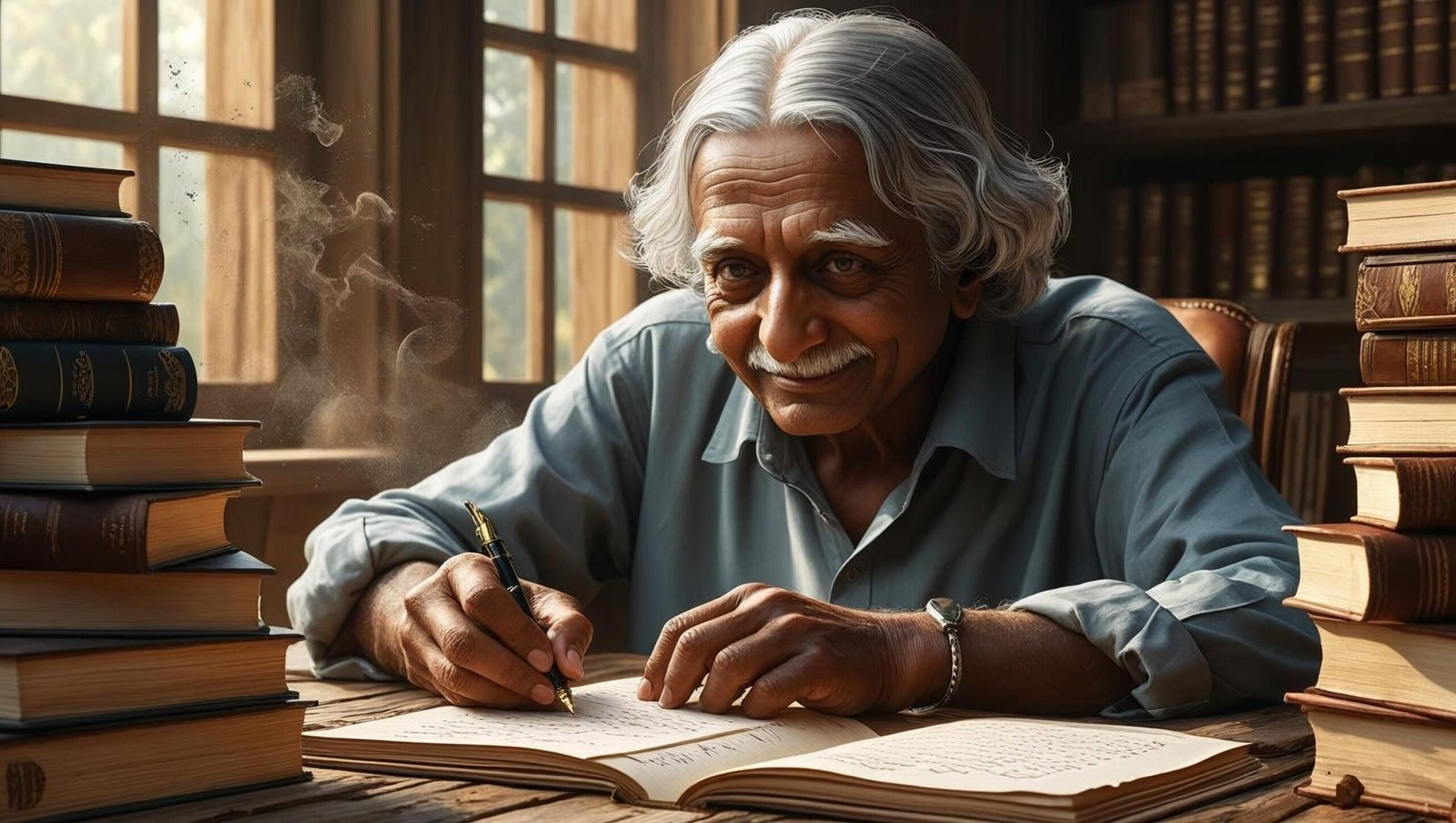Introduction
My Journey by Abdul Kalam is a stirring memoir that narrates the evolution of one of India’s most respected figures. This collection of life experiences, shared with grace and humility, invites readers to reflect on the nature of purpose, perseverance, and national service. With simple words and deep meaning, Kalam’s reflections motivate the reader to transform personal dreams into meaningful action.

1. Humble Beginnings in Rameswaram
Born on 15 October 1931 in the coastal town of Rameswaram, Tamil Nadu, Kalam hailed from a modest Muslim household. His father, Jainulabdeen, was an imam, and his mother, Ashiamma, a deeply caring homemaker. Life was not luxurious, but it was rich in values. Kalam recalls growing up in a house filled with love, integrity, and strong spiritual traditions. The harmonious coexistence of different faiths in his hometown made a lasting impression, nurturing in him a lifelong belief in unity.
2. The Influence of Mentors
One of the central themes of My Journey by Abdul Kalam is the crucial role of mentors. From his cousin Ahmed Jalalludin to his teacher Iyadurai Solomon, and later, pioneers like Vikram Sarabhai and Satish Dhawan, Kalam found guidance and encouragement. These figures shaped not only his career but also his character. They instilled discipline, curiosity, and faith in his potential—teaching him that true learning begins with humility.
3. Embracing Failures as Stepping Stones
Kalam does not shy away from admitting failures. In My Journey by Abdul Kalam, he presents setbacks not as ends but as turning points. The failed launch of the SLV-3 rocket is shared with honesty and emotional depth. Rather than defeat, it brought renewed determination. Support from his colleagues and leaders reaffirmed his belief that perseverance is greater than perfection. Kalam’s ability to rise from failure shows how adversity often lays the foundation for triumph.
4. The Power of Dreams and Determination
For Kalam, dreaming is not a passive act—it is the first step toward reality. He believed that dreams are not what you see in sleep, but what keep you awake. My Journey by Abdul Kalam reminds us that dreams require effort, planning, and courage. Despite humble beginnings, he visualised a future in science and nation-building. His journey shows that it is not where you start but how far your aspirations take you that matters.
5. Commitment to Education and Youth Empowerment
Education was Kalam’s eternal passion. He believed that the strength of a nation lies in the hands of educated, inspired youth. In My Journey by Abdul Kalam, he shares accounts of school visits and heartfelt conversations with students. He often reminded them to think big, act courageously, and give back to society. He dedicated his post-presidency years to nurturing young minds, considering it his greatest mission.

6. Spirituality and Inner Strength
Though rooted in science, Kalam’s life was profoundly spiritual. He drew guidance from scriptures of various faiths, finding harmony between logic and belief. His strength came from prayer, meditation, and reflection. In My Journey by Abdul Kalam, spirituality is not presented as dogma but as a quiet force that sustained him through crises and elevated his sense of duty. It made him calm in defeat and humble in success.
7. Legacy of Service and Integrity
Kalam’s leadership was always marked by service, not authority. As President, he chose transparency, simplicity, and accessibility. Even in high office, he retained the soul of a teacher and citizen. My Journey by Abdul Kalam reinforces that the truest form of leadership lies in example, not command. He lived not for status, but for contribution. His life is a reminder that greatness comes not from titles, but from selfless dedication.
8. Stories of Simplicity and Self-Reliance
One of the distinguishing traits in My Journey by Abdul Kalam is the constant emphasis on leading a simple life. Whether it was travelling in economy class as a scientist or choosing minimalistic accommodation even after assuming the nation’s highest office, Kalam never allowed material wealth to distract him from his core purpose. His memoir offers numerous stories where he opted for austerity in both his public and private life.
In one particularly moving account, Kalam describes how he would walk miles to collect tamarind seeds as a child, not just to earn a few paise but to contribute to his family’s limited income. Such early acts of contribution instilled in him a sense of pride in self-reliance. My Journey by Abdul Kalam is filled with similar moments that show how humility and independence can coexist. Readers are reminded that true richness lies not in possessions but in one’s principles.
9. Importance of Listening and Reflection
In today’s world, everyone wants to be heard, but few are willing to listen. My Journey by Abdul Kalam teaches us that real wisdom often lies in silence and introspection. Kalam was a keen observer and an even more attentive listener. From his school days to his years as a scientist and then as President, he always practiced the art of listening—whether to a child asking a question or to a farmer explaining his struggles.
The memoir reveals how this habit of reflection allowed him to find clarity amid complexity. Whether designing space vehicles or crafting policies, Kalam often retreated to solitude, pondered, and emerged with greater conviction. My Journey by Abdul Kalam invites readers to take time out for contemplation—to digest knowledge, process emotions, and hear the voice of conscience.
10. Science as a Tool for Nation Building
Kalam was not just a scientist; he was a scientific patriot. For him, science was not confined to laboratories—it was a means to serve the masses. My Journey by Abdul Kalam reiterates that technology must have a human face. Whether through the Integrated Guided Missile Development Program or through his involvement in satellite launch missions, his goal was to make India self-reliant.
He recounts moments of breakthrough and frustration in equal measure, showing that innovation is a slow, determined process. But above all, his scientific mind was driven by empathy. In My Journey by Abdul Kalam, one reads how he collaborated with doctors to develop lightweight calipers for polio-affected children. This intersection of science and compassion defines the tone of his work and life.

11. Personal Discipline and Time Management
One of the more subtle yet profound lessons in My Journey by Abdul Kalam is the value of personal discipline. He believed that every second wasted was a disservice to one’s potential. His daily routine was marked by early rising, structured reading, prayer, physical activity, and unflagging commitment to work.
In the memoir, he writes how he prepared extensively for even the smallest task, whether it was a lecture at a school or a major policy decision. This habit of meticulous planning enabled him to manage numerous responsibilities with clarity and focus. My Journey by Abdul Kalam thus provides a blueprint for time management that balances productivity with peace of mind.
12. Anecdotes that Touch the Soul
Unlike many autobiographies that present a linear timeline, My Journey by Abdul Kalam is a mosaic of stories—each carefully chosen for its moral depth. One such anecdote is of a schoolchild who asked him, “How can I become like you?” Rather than giving a generic answer, Kalam encouraged the child to dream boldly, study sincerely, and love the country deeply.
In another touching episode, he speaks of the pain of losing close colleagues and the weight of leadership in times of national crisis. His vulnerability adds to his credibility. The stories in My Journey by Abdul Kalam do not preach; they resonate because they emerge from real emotions and lived wisdom.
13. Kalam’s Vision for India
While My Journey by Abdul Kalam is a personal memoir, it is inherently tied to his larger vision for India. He imagined a nation where knowledge, spirituality, and entrepreneurship would empower every citizen. His ‘Vision 2020’ reflected this dream and was rooted in reality, not fantasy.
The book discusses how India could transform from a developing nation into a knowledge superpower by investing in education, rural development, and technological innovation. In this context, My Journey by Abdul Kalam serves not just as an autobiography, but also as a manifesto of national progress. It calls upon every reader to contribute to India’s resurgence with conviction and competence.
14. Literary Style and Readability
One of the remarkable features of My Journey by Abdul Kalam is its simplicity. The language is devoid of pomp or jargon. This makes it accessible even to high school readers. The prose flows like a conversation, intimate yet informative. There is a profound sincerity in every sentence, a rhythm that matches the humility of the author.
The book uses anecdotes instead of philosophical discourses, thereby making life lessons digestible. In this way, My Journey by Abdul Kalam transcends linguistic and educational boundaries. It becomes a book for every Indian, regardless of age or academic background.

15. A Teacher Forever
Even as President of India, Kalam considered himself first and foremost a teacher. This is evident throughout My Journey by Abdul Kalam, where his happiest memories are often those of classroom interactions or youth conventions. He believed that igniting young minds was not an occasional activity but a lifelong mission.
Whether it was addressing school assemblies, replying to letters from students, or engaging in science demonstrations, Kalam always made time to teach. The memoir is filled with such moments where he felt fulfilled not by power, but by purpose. My Journey by Abdul Kalam stands as a reflection of his core identity as a mentor to the youth.
16. Relevance in Today’s World
Though published years ago, the values enshrined in My Journey by Abdul Kalam are more relevant than ever. In a world clouded by self-interest, noise, and distraction, this memoir is a breath of fresh air. It reminds readers that integrity still matters, that quiet effort still leads to greatness, and that genuine leadership is born of service.
His life story is a counter-narrative to the culture of instant success. My Journey by Abdul Kalam reminds us that progress takes time, sacrifice, and patience. It is a handbook for anyone disillusioned by today’s fast-paced world and searching for authentic meaning.
17. Global Recognition and International Outreach
Many readers of My Journey by Abdul Kalam are surprised to learn how quickly the memoir crossed national borders. After its initial success in India, translations appeared in French, Japanese, Arabic, and several Southeast-Asian languages. Kalam was invited to address UNESCO in Paris, where he spoke of “knowledge without borders” and held up My Journey by Abdul Kalam as evidence that personal stories can unite cultures in a shared quest for dignity. From Seoul to São Paulo, university audiences heard him explain that science and spirituality are complementary, not contradictory. His conviction that a village boy from Rameswaram could converse with Nobel laureates reinforced a foundational idea of the book: talent belongs to humanity, not to geography.
18. The Power of Personal Letters and Humility
A touching feature of My Journey by Abdul Kalam is his habit of replying personally to letters. A young girl from Nagaland once wrote about her school’s lack of a lab; he responded with a portable chemistry kit and words of encouragement. She later became a science teacher and credited that gesture. Even as President, Kalam continued writing replies by hand—proof that humility defined his greatness. This spirit makes My Journey by Abdul Kalam feel like a conversation with a wise elder, not a distant icon.
19. Applying the Lessons in Contemporary Life
The modern workplace—remote teams, rapid pivots, constant metrics—may seem far removed from the launchpads and prayer halls of My Journey by Abdul Kalam. Yet the memoir’s lessons remain sharply relevant. Project managers can adopt his principle of “shared victory, owned failure,” ensuring credit is distributed while mistakes are shouldered by leaders. Start-ups can model his frugal innovation; Kalam built prototypes from scrap metal before budget approval, a tactic now echoed in MVP (minimum viable product) culture. Educators can borrow his practice of beginning every class with a vivid question, a technique described in My Journey by Abdul Kalam that ignites curiosity faster than any slideshow.
On a personal level, readers are urged to set three intertwined goals—professional excellence, community uplift, and inner harmony—just as Kalam did. He reminds us that journaling small daily progress, a tip buried in My Journey by Abdul Kalam, turns vague ambition into measurable advance. Whether you are coding an app or cultivating a garden, the memoir insists that disciplined routine, empathy, and unfaltering ethics convert ordinary lives into purposeful odysseys.
20.A Legacy of Light
My Journey by Abdul Kalam leaves behind more than memories—it offers a roadmap for ethical living. Each page reflects resilience, purpose, and compassion. The book continues to inspire generations to dream boldly and serve selflessly, proving that greatness begins not in privilege, but in unwavering character and vision.

Conclusion
My Journey by Abdul Kalam is not just a recounting of a remarkable life—it is a philosophical guide for purposeful living. The themes of simplicity, education, spirituality, discipline, and service are woven seamlessly into every chapter. The memoir speaks to every reader, not through grandstanding, but through the soft power of truth.
For young dreamers, it is a lighthouse. For struggling professionals, it is a reminder to persist. For leaders, it is a call to serve with integrity. Few books combine humility with heroism so naturally. Reading My Journey by Abdul Kalam is like sitting beside a wise elder who tells you: “Do not be afraid to dream, and never give up trying.”
Whether you are a student, teacher, entrepreneur, or citizen, this book will leave you enriched. It affirms that the journey of a single individual, when rooted in values, can uplift an entire nation.
To read more such in-depth reflections and reviews, visit:
👉 shubhanshuinsights.com
Frequently Asked Questions (FAQs)
Q1: What is the core message of My Journey by Abdul Kalam?
The book urges readers to nurture dreams, embrace failures, and serve the nation with integrity.
Q2: Who should read this book?
Students, educators, and dreamers of all ages will find deep wisdom and encouragement in this book.
Q3: What distinguishes this book from other autobiographies?
Unlike traditional autobiographies, this book is intimate and anecdotal, focused more on moral insight than chronological events.
Q4: Is this suitable for young readers?
Yes, the book is written in a clear and relatable tone, making it perfect for youth.
Q5: Where can I buy My Journey by Abdul Kalam?
It is widely available on platforms like Amazon, Flipkart, and major bookstores.
Comments from Readers
Ananya Sharma:
This review has deeply moved me. It makes me want to read the book all over again.
Rahul Verma:
Abdul Kalam’s humility shines in every chapter. This blog captured his essence beautifully.
Priya Desai:
Insightful and inspiring. I will be sharing this review with my students!
To dive deeper into meaningful book reviews, visit:
📘 shubhanshuinsights.com
Let this story inspire your journey forward.